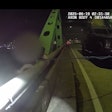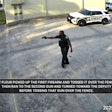Attorney General Eric H. Holder Jr. on Friday barred local and state police from using federal law to seize cash, cars and other property without evidence that a crime occurred.
Holder’s action represents the most sweeping check on police power to confiscate personal property since the seizures began three decades ago as part of the war on drugs.
Since 2008, thousands of local and state police agencies have made more than 55,000 seizures of cash and property worth $3 billion under a civil asset forfeiture program at the Justice Department called Equitable Sharing, the Washington Post reports.
The program has enabled local and state police to make seizures and then have them “adopted” by federal agencies, which share in the proceeds. The program allowed police departments and drug task forces to keep up to 80 percent of the proceeds of the adopted seizures, with the rest going to federal agencies.
While police can continue to make seizures under their own state laws, the federal program was easy to use and required most of the proceeds from the seizures to go to local and state police departments. Many states require seized proceeds to go into the general fund.
A Justice official, who spoke on the condition of anonymity in order to discuss the attorney general’s motivation, said Holder “also believes that the new policy will eliminate any possibility that the adoption process might unintentionally incentivize unnecessary stops and seizures.”
Holder’s decision follows a Washington Post investigation published in September that found that police have made cash seizures worth almost $2.5 billion from motorists and others without search warrants or indictments since the terrorist attacks of Sept. 11, 2001.
The Post found that local and state police routinely pulled over drivers for minor traffic infractions, pressed them to agree to warrantless searches and seized large amounts of cash without evidence of wrongdoing. The law allows such seizures and forces the owners to prove their property was legally acquired in order to get it back.
















